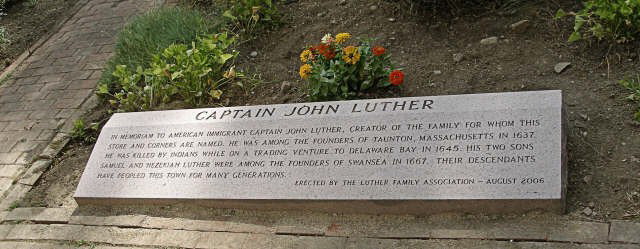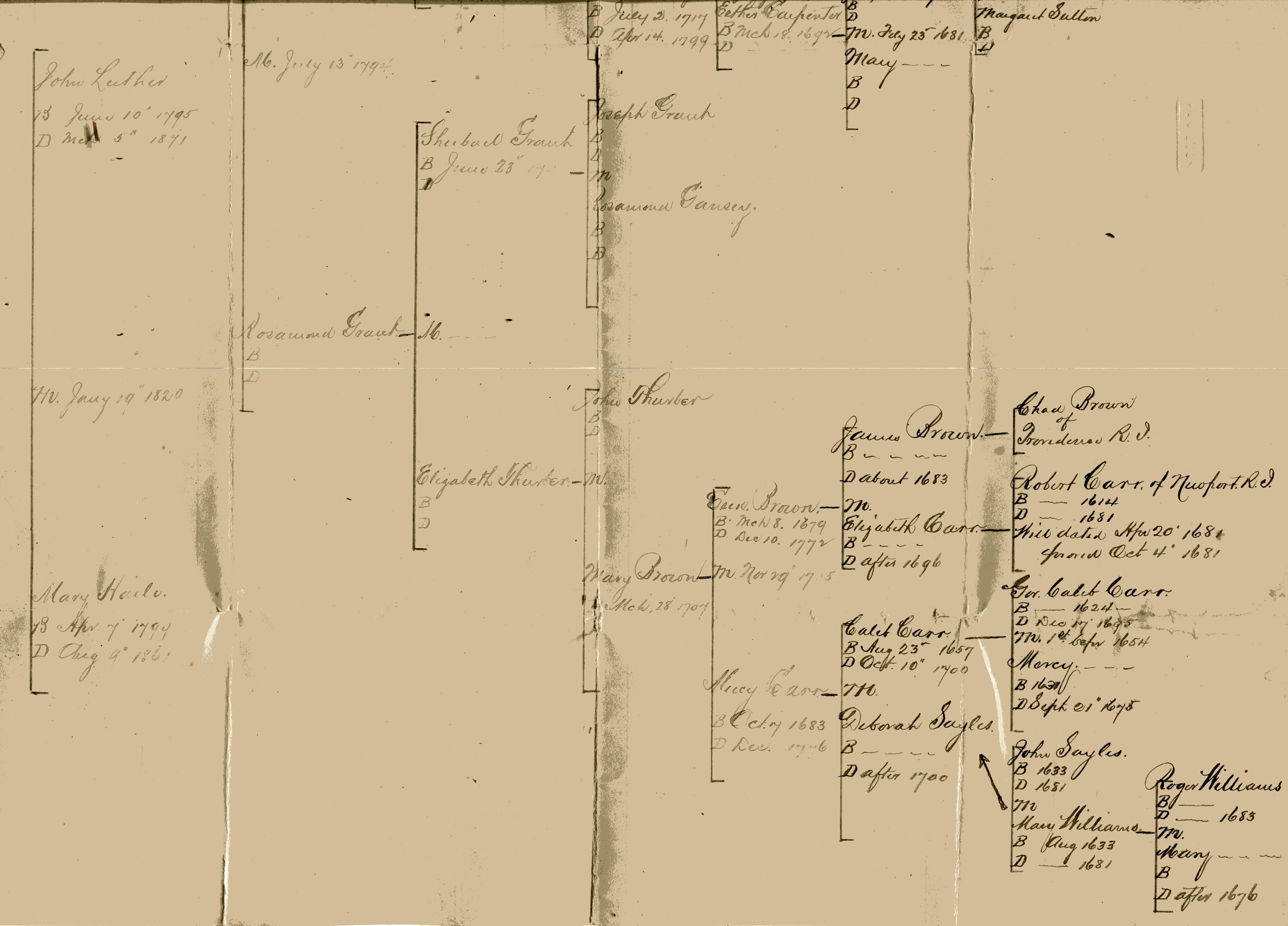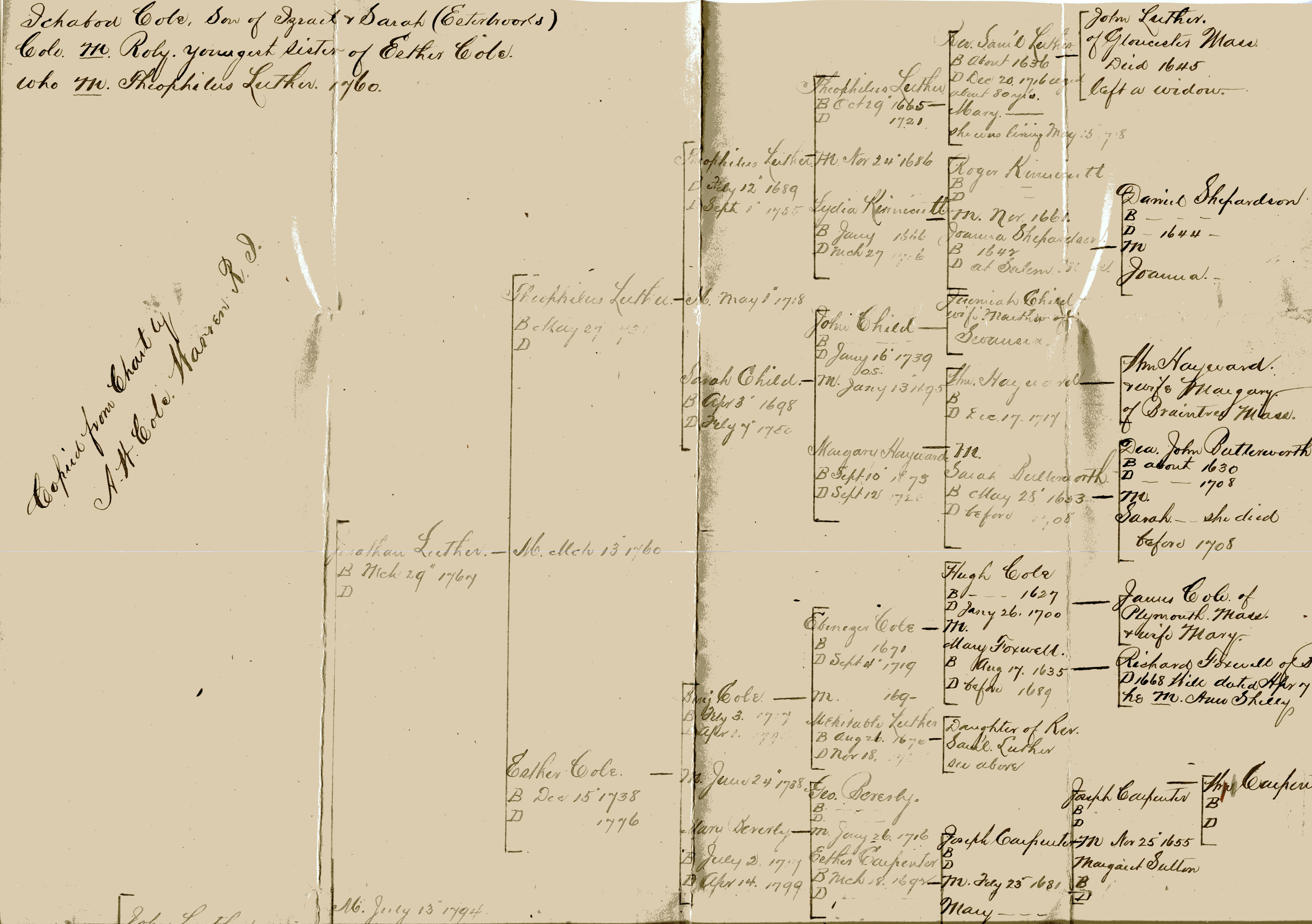He likely married Elizabeth Addams on January 9, 1625 at Bridport, Dorset. (Bridport, Dorset County Parish Records, Dorset Records Office, Dorchester, Dorset, England, p. 273 of 1315 at Ancestry.com on line records).
He, his wife and probably son Samuel emigrated from England to Massachusetts during the Great Puritan Emigration, in 1637-8. Early Town records show that he was an original proprietor of land in both Taunton and Gloucester, Massachusetts.
He died in Delaware Bay in the spring of likely 1644 on a fur trading expedition, when killed by Indians. (Winthrop's Journal, "History of New England", Vol. II, General Editor J. Franklin Jameson, 1908, pages 210, 211, 246 & 247). At the time, he was master of a sailing ship (pinnace) belonging to Boston Merchants. The ship was attacked by Indians, and although Capt. John was killed, his son Samuel escaped and was returned to his mother Elizabeth.
In 1646, Elizabeth "Luter", Capt. John's widow, filed a petition to the General Court of Massachussets for payment of her husband's wages for his last voyage. The Court eventually awarded her some compensation. This petition connects Captain John to the indian massacre in Delaware Bay mentioned in Winthrop's Journal.
Winthrop's Journal, "History of New England", Vol. II, General Editor J. Franklin Jameson, 1908, pages 246 & 247), has two recitations of the foregoing incident.
The first, at pages 210 &211 reads as follows:
"A bark was sent out from Boston with seven men to trade at Delaware. They staid in the river near the English plantations all winter, and in the Spring they fell down and traded three weeks, and had gotten five hundred skins, and some otter and being ready to come away, fifteen indians do come aboard as if they would trade again and suddenly drew forth hatchets from under their coats and killed the master and three others and rifled the bark and carried away a boy and another man who was the interpreter, and when they came ashore they gave him forty skins and twenty fathom of wampom, and other things and kept them until about six weeks after. The Swedish governor procured another sachem to fetch them to him, who sent them to New Haven by a bark of that place and so they were brought to Boston....".
The second recitation by Winthrop, at pages 246 & 247, reads as follows:
"The Merchants of Boston sent a pinnace the last winter to trade in Delaware Bay. She traded upon the Maryland side, and had gotten a good parcel of beaver; at last the Indians came aboard, and while the English ( who were about five and a boy) were trading with some of them, others drew out hatchets from under their coats, and killed the master and three others, and took the other and the boy, and carried them on shore, and rifled the pinnace of all her goods and sails & etc. Soon after, other indians came upon these and slew the sachem, and took away all their goods they had stolen. There was one Redman suspected to have betrayed their pinnace, for he being linkister ( because he could speak the language), and being put out of that employment because of his evil carriage, did bear ill will to the master, and the Indians spared him, and gave him a good part of the spoil, and he lived amongst them five or six weeks, till the Swedish governour procured other Indians to go fetch him and the boy to his fort, from whence they were brought to Boston, and then said Redman was tried for his life, and being found guilty by the grand jury, was deferred his farther trial in expectation of more evidence to come from Delaware."
He likely married Elizabeth Addams on January 9, 1625 at Bridport, Dorset. (Bridport, Dorset County Parish Records, Dorset Records Office, Dorchester, Dorset, England, p. 273 of 1315 at Ancestry.com on line records).
He, his wife and probably son Samuel emigrated from England to Massachusetts during the Great Puritan Emigration, in 1637-8. Early Town records show that he was an original proprietor of land in both Taunton and Gloucester, Massachusetts.
He died in Delaware Bay in the spring of likely 1644 on a fur trading expedition, when killed by Indians. (Winthrop's Journal, "History of New England", Vol. II, General Editor J. Franklin Jameson, 1908, pages 210, 211, 246 & 247). At the time, he was master of a sailing ship (pinnace) belonging to Boston Merchants. The ship was attacked by Indians, and although Capt. John was killed, his son Samuel escaped and was returned to his mother Elizabeth.
In 1646, Elizabeth "Luter", Capt. John's widow, filed a petition to the General Court of Massachussets for payment of her husband's wages for his last voyage. The Court eventually awarded her some compensation. This petition connects Captain John to the indian massacre in Delaware Bay mentioned in Winthrop's Journal.
Winthrop's Journal, "History of New England", Vol. II, General Editor J. Franklin Jameson, 1908, pages 246 & 247), has two recitations of the foregoing incident.
The first, at pages 210 &211 reads as follows:
"A bark was sent out from Boston with seven men to trade at Delaware. They staid in the river near the English plantations all winter, and in the Spring they fell down and traded three weeks, and had gotten five hundred skins, and some otter and being ready to come away, fifteen indians do come aboard as if they would trade again and suddenly drew forth hatchets from under their coats and killed the master and three others and rifled the bark and carried away a boy and another man who was the interpreter, and when they came ashore they gave him forty skins and twenty fathom of wampom, and other things and kept them until about six weeks after. The Swedish governor procured another sachem to fetch them to him, who sent them to New Haven by a bark of that place and so they were brought to Boston....".
The second recitation by Winthrop, at pages 246 & 247, reads as follows:
"The Merchants of Boston sent a pinnace the last winter to trade in Delaware Bay. She traded upon the Maryland side, and had gotten a good parcel of beaver; at last the Indians came aboard, and while the English ( who were about five and a boy) were trading with some of them, others drew out hatchets from under their coats, and killed the master and three others, and took the other and the boy, and carried them on shore, and rifled the pinnace of all her goods and sails & etc. Soon after, other indians came upon these and slew the sachem, and took away all their goods they had stolen. There was one Redman suspected to have betrayed their pinnace, for he being linkister ( because he could speak the language), and being put out of that employment because of his evil carriage, did bear ill will to the master, and the Indians spared him, and gave him a good part of the spoil, and he lived amongst them five or six weeks, till the Swedish governour procured other Indians to go fetch him and the boy to his fort, from whence they were brought to Boston, and then said Redman was tried for his life, and being found guilty by the grand jury, was deferred his farther trial in expectation of more evidence to come from Delaware."
Gravesite Details
He was buried at sea in the Delaware Harbor after being killed by Indians.








